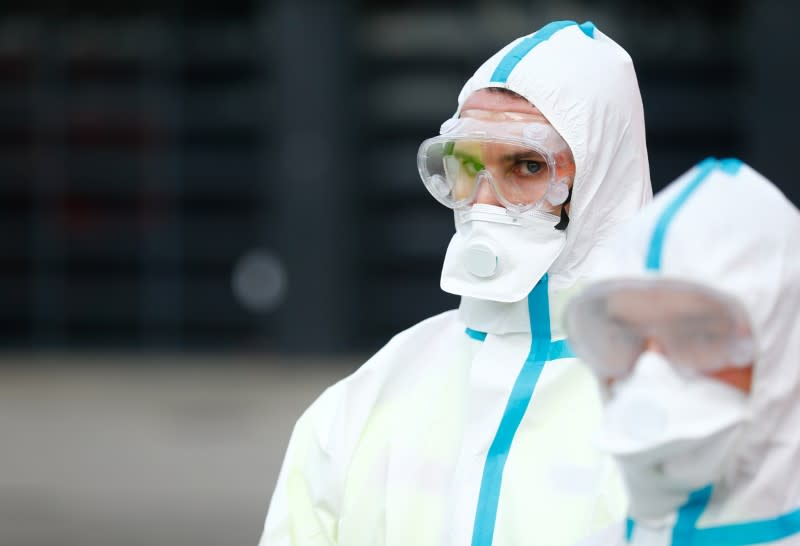Germans warned: Keep your distance or face a curfew
By Andreas Rinke and Douglas Busvine
BERLIN (Reuters) - Germany may enforce a nationwide curfew if the country's 83 million people fail to keep their distance from each other this weekend to curb the spread of coronavirus, government and health leaders said on Friday.
Angela Merkel's spokesman said the German chancellor would hold talks with regional leaders on Sunday to judge whether the nation had complied with official guidance to stay at home and avoid crowds.
"They will carry out a ruthless analysis of the situation," Stefan Seibert told a news conference. "How the public behaves on Saturday will be decisive."
Germany has suffered just 31 fatalities from COVID-19 thanks to early testing for the flu-like illness, so far avoiding the fate of countries that have been harder hit such Italy, which now has the highest death toll in the world.
But with the number of German cases jumping overnight by 2,958 to 13,957, the pandemic has now entered an exponential phase that, if unchecked, could infect as many as 10 million people within three months, health officials say.
Under Germany's federal system, Merkel can't impose a nationwide curfew as this would be a matter for state and local government.
Pre-empting Sunday's crisis meeting, Bavaria, Germany's biggest state covering about a fifth of the country, said on Friday it would impose general restrictions on going out for two weeks from midnight.
"We aren't shutting Bavaria down. We aren't locking Bavaria in. But we are bringing public life in Bavaria to a complete halt," Chief Minister Markus Soeder said in a TV address.
'KEEP YOUR DISTANCE'
The southwestern city of Freiburg has announced that it would impose a curfew from the weekend, while North Rhine-Westphalia, Germany's most populous state, may follow suit.
"If people don't show the necessary commitment, then we can take this decision," Chief Minister Armin Laschet said.
Germany has already closed schools, shops and restaurants and appealed to the good sense of people to take responsibility for slowing the spread of the disease.
But compliance has been patchy, with crowds gathering in parks, playgrounds and street cafes in towns and cities across the country over the past week.
"We can only slow this epidemic if we stick to the rules of the game. Keep your distance!" said Lothar Wieler, president of the Robert Koch Institute, the agency coordinating efforts to slow the pandemic.
Merkel urged Germans to take the coronavirus crisis seriously in an address to the nation on Wednesday that was widely seen as preparing the country for tougher measures.
The German Epidemiology Society said it supported the measures taken so far but urged that they be subject to critical, ongoing review.
"There is a short window of opportunity to choose between containing and slowing the spread of this infection without overburdening our health system," it said. "In both cases, rigorous enforcement will be needed for a long period of time."
Stefan Kluge, head of intensive medicine at the Hamburg University Hospital, called for an immediate curfew.
"We have to reduce the number of new infections - that's why I am in favour of a rigorous and immediate curfew," Kluge told ARD public television.
(Additional reporting by Markus Wacket; Editing by Thomas Seythal and David Clarke)

 Yahoo News
Yahoo News 

